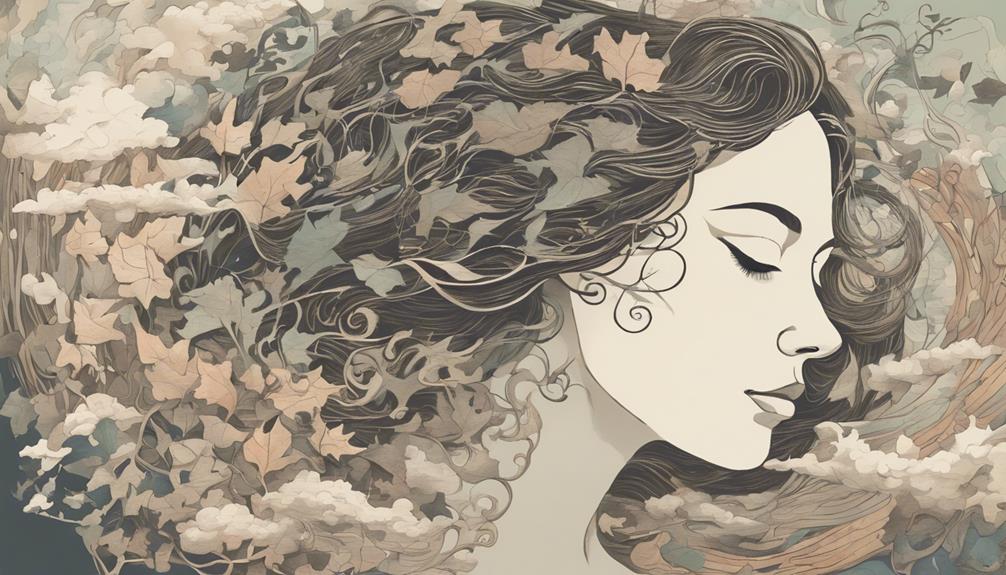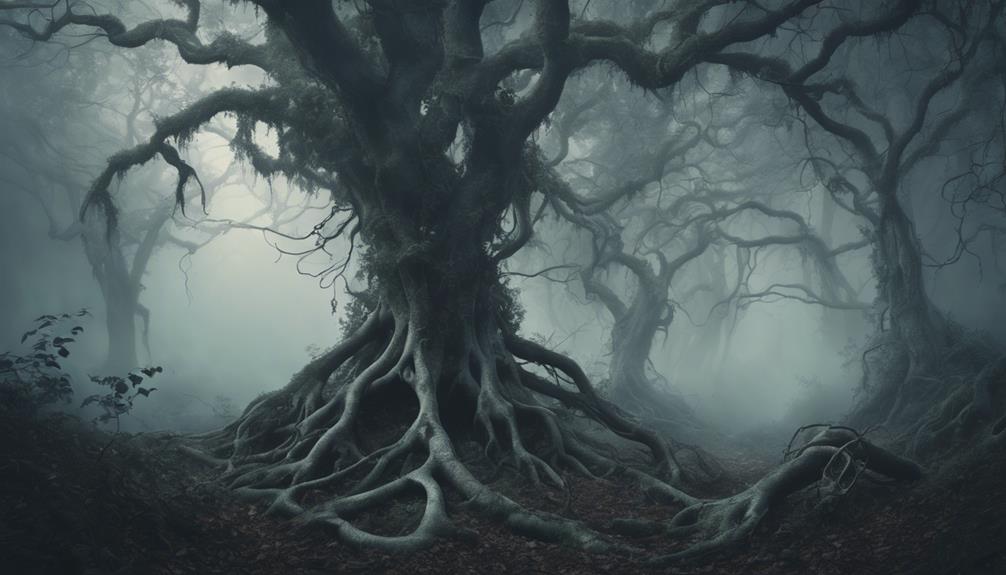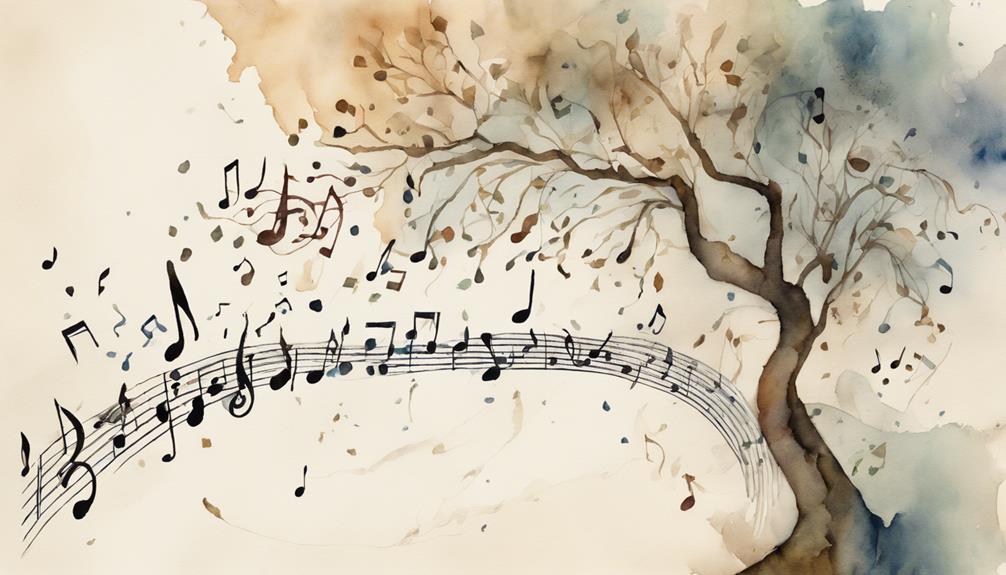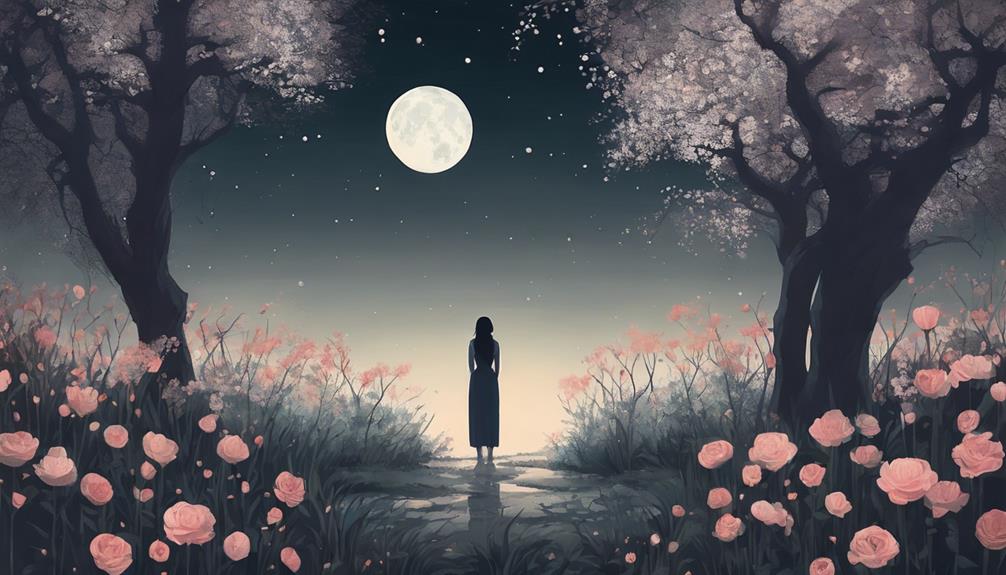In Theodore Roethke's poem "I Knew a Woman," you're drawn into the speaker's emotional landscape, where peaks of ardor and valleys of disillusionment converge. The titular woman embodies an enigmatic elusiveness, reflecting the speaker's own turmoil. Roethke's dreamlike imagery and symbolism weave together the concrete and abstract, as the poem's structure and rhythm echo the fractured emotions. As you navigate this labyrinthine exploration of love, desire, and longing, you'll uncover the complexities of the human experience. And as you venture deeper, the poet's nuances and subtleties will continue to reveal themselves, layer by layer.
Unraveling the Speaker's Emotional Landscape

As you explore the poem 'I Knew a Woman,' it becomes evident that the speaker's emotional landscape is a complex tapestry, woven from threads of fascination, frustration, and introspection. This intricate emotional topography is characterized by peaks of ardor and valleys of disillusionment, revealing a speaker who is both captivated and confounded by the titular woman. Through the poem, the speaker engages in a form of psychological cartography, mapping the contours of their own psyche as they navigate the labyrinthine corridors of their emotions. This cartography reveals a speaker who is simultaneously drawn to and repelled by the woman, their emotions oscillating between infatuation and disillusionment. As you explore further into the poem, it becomes clear that the speaker's emotional landscape is a dynamic, ever-shifting terrain, shaped by the push-and-pull of their conflicting desires and anxieties.
The Titular Woman: Enigmatic and Elusive

In the poem's titular figure, you explore a woman who embodies an enigmatic elusiveness, her presence hovering at the threshold of comprehension, perpetually retreating from the speaker's grasp like a will-o'-the-wisp. This enigmatic presence is a hallmark of the feminine mystique, a mystique that has captivated and confounded the speaker. Her elusive nature serves as a mirror, reflecting the speaker's own emotional turmoil and insecurities.
As you investigate further into the poem, you begin to realize that the titular woman's elusiveness is not just a characteristic, but a deliberate choice. She seems to revel in her opacity, leaving the speaker (and the reader) to grapple with the fragments of her presence. This deliberate ambiguity creates a sense of tension, underscoring the speaker's frustration and longing. The titular woman's enigmatic presence becomes a metaphor for the unattainable, a symbol of the unbridgeable gap between the self and the other.
Roethke's Use of Imagery and Symbolism

You find yourself drawn into the rich tapestry of Roethke's poetry, where imagery and symbolism merge to create a dreamlike atmosphere that is at once both intimate and elusive. As you explore further, you're struck by the poet's masterful use of sensory language, which transports you to a world of vivid colors, textures, and scents. The natural world, in particular, serves as a potent symbol, with trees, flowers, and seasons evoking emotions and ideas that linger long after the poem's final line.
Roethke's imagery is deliberate and precise, conjuring the tangible and the ephemeral with equal ease. The 'green slope' and 'warm air' evoke a sense of languor, while the 'tangled' and 'twisted' branches suggest the complexities of human relationships. Even the most fleeting images – a 'leaf' or a 'shadow' – acquire symbolic weight, inviting you to ponder their significance within the poem's labyrinthine structure. As you navigate this intricate web of imagery and symbolism, you begin to grasp the full extent of Roethke's artistry, which weaves together the concrete and the abstract to create a poetry that is at once both earthy and otherworldly.
Themes of Love, Desire, and Longing

Through the prism of Roethke's lyrical language, the poet's fascination with the human experience of love, desire, and longing comes sharply into focus, revealing a complex interplay of emotions that oscillate between tender intimacy and existential longing. You become acutely aware of the speaker's deep emotional investment in this woman, which borders on Romantic idealization. The feminine mystique is palpable, as the speaker's desire for connection is tempered by an underlying sense of melancholy and longing. This tension is masterfully conveyed through Roethke's language, which veers between the sensual and the ethereal. As you explore further into the poem, you begin to appreciate the speaker's conflicted psyche, torn between the desire for human connection and the existential anxiety that underpins it. The poem becomes a nuanced exploration of love, desire, and longing, laying bare the complexities of the human experience.
The Poem's Structure and Rhythm

As you explore the intricate architecture of 'I Knew a Woman,' the carefully calibrated structure and rhythm of the poem emerge as a masterful complement to its rich emotional tapestry. The poet's deliberate use of verse fragmentation creates a sense of disjointedness, mirroring the speaker's fractured emotions. This fragmentation also allows for a more nuanced investigation of the speaker's inner world, as each fragmented verse serves as a window into their psyche.
The poetic cadence, marked by a deliberate slowing and quickening of pace, masterfully conveys the speaker's emotional turmoil. The enjambments and caesuras strategically placed throughout the poem create a sense of tension and release, underscoring the speaker's vacillation between desire and longing. The poet's use of anaphora and epistrophe adds a sense of urgency and intensity to the poem, drawing the reader into the speaker's inner world. As you explore further into the poem's structure and rhythm, you'll discover a masterful interplay of form and content, where the poet's technical skill serves to heighten the emotional impact of the poem.
Exploring the Human Experience

In 'I Knew a Woman,' the poet's masterful exploration of the human experience unfolds, intricately weaving together the speaker's inner world with the complexities of human emotion, revealing the multifaceted nature of desire, longing, and connection. As you explore the poem, you'll discover that the speaker's emotional intimacy with the woman is not just a romantic connection, but a profound investigation of human connection. The poet's use of language and imagery creates a sense of vulnerability, allowing you to experience the speaker's emotions firsthand. The poem's investigation of human connection is not limited to romantic relationships; it's a nuanced examination of the human need for emotional intimacy. You'll find that the speaker's emotions are deeply intertwined with the woman's, creating a sense of mutual understanding and empathy. This emotional intimacy is not just a product of romantic love, but a fundamental aspect of the human experience.
The Poem's Universality and Timelessness

You find yourself drawn into the poet's masterful exploration of human connection, where the boundaries of time and space dissolve, and the poem's universality emerges as a profound reflection of the human experience. As you investigate further, you begin to appreciate the cultural significance of the poem, which transcends temporal and spatial constraints, speaking to people across generations and geographical boundaries.
The poem's timeless appeal lies in its ability to capture the essence of human emotions, desires, and struggles, making it relatable to readers from diverse backgrounds. The poet's skillful use of language and imagery creates a sense of intimacy, allowing you to connect with the speaker on a deeply personal level. This connection is what makes the poem's themes and emotions resonate so profoundly, making it a work of enduring relevance.
Ultimately, the poem's universality and timelessness are affirmations of the poet's mastery of the craft, which has resulted in a work that continues to captivate readers, inviting them to reflect on the human condition and their place within it.
Frequently Asked Questions
Is the Poem "I Knew a Woman" Based on a Real-Life Experience?
You're probably wondering if that poem you just read was ripped straight from the poet's diary. And you're not alone – many readers assume that poems are always rooted in autobiographical elements. But, surprisingly, the answer isn't always a straightforward yes or no. While poets often draw from personal experiences, the line between fact and fiction blurs. So, is the poem based on a real-life experience? Let's dive deeper to find out.
What Inspired Theodore Roethke to Write This Poem?
As you explore the creative process of Theodore Roethke, you'll discover that his poetic inspiration often stemmed from the complexities of human relationships. In 'I Knew a Woman,' Roethke's fascination with the feminine mystique is palpable, suggesting that his inspiration might have been rooted in his own experiences with women. Perhaps he was drawn to the enigmatic, the mysterious, and the elusive aspects of femininity, which ultimately fueled his creative expression.
Is the Poem's Speaker Meant to Represent the Poet Himself?
As you explore the world of poetry, you begin to wonder: is the speaker's voice an echo of the poet's own? The answer lies in the author's intention, which often blurs the lines between reality and fiction. The poetic voice, a vessel for the poet's thoughts, can be both personal and detached. You'll find that the distinction between the two is often ambiguous, leaving you to ponder the poet's true identity.
Can the Poem Be Interpreted as a Love Letter or Ode?
As you explore the poem, you'll find yourself wondering if it can be interpreted as a love letter or ode. Upon closer examination, it's clear that the poem presents an intimate portrait of the subject, painting a vivid picture of her essence. This Romantic tribute, replete with tender language and affectionate tone, suggests that the poet's intention is indeed to pay homage to the woman, making a strong case for it being a love letter or ode.
Is "I Knew a Woman" Considered One of Roethke's Most Popular Poems?
As you explore Theodore Roethke's body of work, you'll find that 'I Knew a Woman' shines like a beacon, radiating poetic intimacy. This masterpiece is indeed considered one of Roethke's most popular poems, and for good reason. The speaker's lyrical and sensual portrayal of the feminine mystique has captivated readers for generations. With each carefully crafted line, Roethke masterfully weaves a tapestry of emotions, making this poem a proof of his skillful storytelling and nuanced exploration of the human experience.


